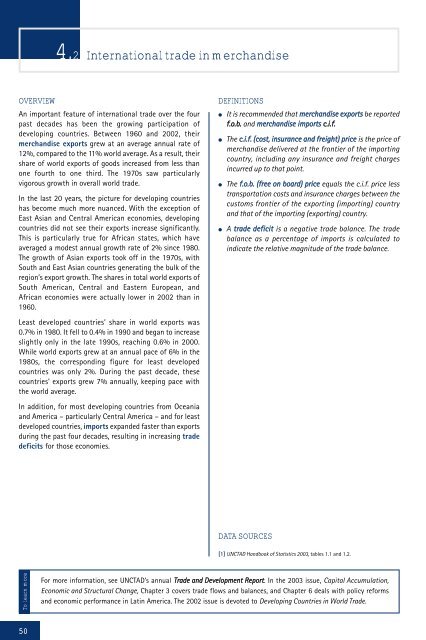Development and Globalization: - Unctad
Development and Globalization: - Unctad
Development and Globalization: - Unctad
Create successful ePaper yourself
Turn your PDF publications into a flip-book with our unique Google optimized e-Paper software.
OVERVIEW DEFINITIONS<br />
An important feature of international trade over the four<br />
past decades has been the growing participation of<br />
developing countries. Between 1960 <strong>and</strong> 2002, their<br />
merch<strong>and</strong>ise exports grew at an average annual rate of<br />
12%, compared to the 11% world average. As a result, their<br />
share of world exports of goods increased from less than<br />
one fourth to one third. The 1970s saw particularly<br />
vigorous growth in overall world trade.<br />
In the last 20 years, the picture for developing countries<br />
has become much more nuanced. With the exception of<br />
East Asian <strong>and</strong> Central American economies, developing<br />
countries did not see their exports increase significantly.<br />
This is particularly true for African states, which have<br />
averaged a modest annual growth rate of 2% since 1980.<br />
The growth of Asian exports took off in the 1970s, with<br />
South <strong>and</strong> East Asian countries generating the bulk of the<br />
region’s export growth. The shares in total world exports of<br />
South American, Central <strong>and</strong> Eastern European, <strong>and</strong><br />
African economies were actually lower in 2002 than in<br />
1960.<br />
Least developed countries’ share in world exports was<br />
0.7% in 1980. It fell to 0.4% in 1990 <strong>and</strong> began to increase<br />
slightly only in the late 1990s, reaching 0.6% in 2000.<br />
While world exports grew at an annual pace of 6% in the<br />
1980s, the corresponding figure for least developed<br />
countries was only 2%. During the past decade, these<br />
countries’ exports grew 7% annually, keeping pace with<br />
the world average.<br />
In addition, for most developing countries from Oceania<br />
<strong>and</strong> America – particularly Central America – <strong>and</strong> for least<br />
developed countries, imports exp<strong>and</strong>ed faster than exports<br />
during the past four decades, resulting in increasing trade<br />
deficits for those economies.<br />
To learn more<br />
50<br />
4.2 International trade in merch<strong>and</strong>ise<br />
● It is recommended that merch<strong>and</strong>ise exports be reported<br />
f.o.b. <strong>and</strong> merch<strong>and</strong>ise imports c.i.f.<br />
● The c.i.f. (cost, insurance <strong>and</strong> freight) price is the price of<br />
merch<strong>and</strong>ise delivered at the frontier of the importing<br />
country, including any insurance <strong>and</strong> freight charges<br />
incurred up to that point.<br />
● The f.o.b. (free on board) price equals the c.i.f. price less<br />
transportation costs <strong>and</strong> insurance charges between the<br />
customs frontier of the exporting (importing) country<br />
<strong>and</strong> that of the importing (exporting) country.<br />
● A trade deficit is a negative trade balance. The trade<br />
balance as a percentage of imports is calculated to<br />
indicate the relative magnitude of the trade balance.<br />
DATA SOURCES<br />
[1] UNCTAD H<strong>and</strong>book of Statistics 2003, tables 1.1 <strong>and</strong> 1.2.<br />
For more information, see UNCTAD’s annual Trade <strong>and</strong> <strong>Development</strong> Report. In the 2003 issue, Capital Accumulation,<br />
Economic <strong>and</strong> Structural Change, Chapter 3 covers trade flows <strong>and</strong> balances, <strong>and</strong> Chapter 6 deals with policy reforms<br />
<strong>and</strong> economic performance in Latin America. The 2002 issue is devoted to Developing Countries in World Trade.

















